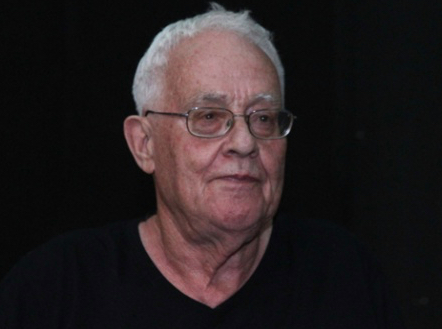With Benedict Anderson on the Schlossberg
December 13, 2015 1 Comment

Benedict Anderson (Verso)
A bit more than four years ago, Benedict Anderson visited Graz for a talk “Why We Believe Our Nation Is Good“at the university. As luck would have it, I was not going to be in town and very much regretted my absence. However, it turned out that none of the organizers were available to give him a tour of the city and thus on sunny Wednesday mid-October 2011 a Luxembourger, who had just come to Graz a year before, set out to show Benedict Anderson around. Of course, this is strictly speaking illegal as tour guides have to officially certified by the city of Graz, but then again my description of Graz was hardly a competition to those of the professionals.
We took a delightful stroll through the center of town and I was struck by having a highly observant on my side. As he later noted, he enjoyed “seeing Lust und Laune against Law and Order”–a graffiti we spotted in the pedestrian zone.
Up on the Schloßberg, the view was not only magnificent, but also the numerous monuments to the nation seemed a fitting setting for our walk: we saw the Hackher-Löwe, glorifying Habsburg resistance to Napoleons army in 1809, and among others the monument to the “Kärnter Abwehrkampf”–the Carinthian “resistance” to Yugoslav claims to the region after World War One, a nasty little monument erected in 1980.
To quote a reflection on this walk I wrote two years ago, Anderson “remarked poignantly that it is probably only scholars of nationalism that notice these monuments, whereas ordinary citizens walk past and ignore these monuments to an era that seems of little relevance today.” He was right, of course, the tourists and visitors on the Schlossberg paid little attention to this or most other monuments and so it is all over the world (thank god). Monuments are often forgotten–they are the frozen manifestation of the past and that only resonates in particular moments–either if this past is important and-or the present seems to require such an interpretation.
I was struck by Benedict Anderson’s humbleness in this throwaway comment. Here, one of the most important scholars of nationalism mocked his own and our perceived self-importance. Of course, he was very much aware that nationalism matters and continued to matter, he modest attitude was engaging.
When I read his book some two decades earlier, I had no idea that I would get a chance to ever meet him. Together with two other grand scholars of nationalism Ernst Gellner and Eric Hobsbawm, his book transformed the field of research and helped to emergence of countless research that is informed by his toughts and insights. As any brilliant turn of phrase, the one of the “immagined community” has also become a curse. Too often, the word imagined has led the casual and lazy readers to conclude that nations are just an “imagination” or less real–instead, the idea that they are imagined does not deprive them of their persistence and reality.While all three, Hobsbawm, Gellner and Anderson come from different disciplines and made their careers in different institutions, they did not only share their connection to England, but more importantly their personal biographies that were complicated and did not fit neat nation categories. Thus, not only their intellectual background, but also their personal biography contributed to looking behind the state of nationalism and helping open a new field of inquiry, a note that I can personally relate to.
As a researcher who has been part of this field in one way or another and Benedict Anderson has made a tremendous contribution and while I am saddened by the loss, I am glad to have had those few hours in Graz to show my appreciation for his work.

Dear Florian,
It was very nice of you to remember Ben through such a nice personal reflection. I am a close family friend with the Andersons and have known Ben since I was 18. We used to have long discussions about the Balkan nationalism over a cup of tea and gooseberry jam.
He will be very much missed….
Thanks, Miran